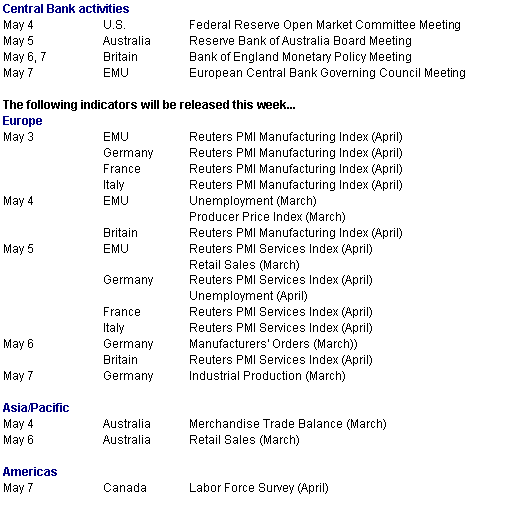Monday, May 3, 2004

Global markets in turmoil
It was a bad week for global equities. Investors sold holdings as positive economic data - once good news for the markets - reinforced beliefs that interest rate increases were looming in the not too distant future. Particularly worrisome were thoughts that both the U.S. and China are on the verge of higher rates. China is trying to reign in growth, and there were signs of inflation in China and the U.S. And underneath it all is the unstable situation in Iraq that continues to be troublesome for investors. To make matters worse, the travails of a bellwether company contributed to April's rocky end after Nortel Networks fired top executives because of accounting issues.
Concerns about rising interest rates reasserted themselves. Last week speculation intensified that higher-than-expected inflation readings might force the Fed into action sooner than already expected. But some analysts believe investors are missing the bigger picture with rising rates, pointing out that rates go up because the economy is strong, not weak.
All indexes followed here were down last week. In April those indexes in Japan, Britain and Europe were up on the month. Indexes in Hong Kong and the U.S. are below their year end 2003 levels.
Global Stock Market Recap

Europe and Britain
It was much the same story everywhere. Stocks swooned last week, losing much of the gains achieved in the first three weeks of April thanks to interest rate concerns. The FTSE was pressured by uninspiring earnings from Unilever. European stock indexes had their biggest weekly losses since the Madrid bombings. Mining shares sank on concern China's efforts to stem economic growth will hurt demand for metals. Siemens AG dropped after Germany's largest engineering company said it would struggle to meet its profit target.

Stocks fell amid signs the Chinese government is stepping up efforts to cool the economy. It has been broadly intimated that China might raise interest rates this week and that the government has already told banks to restrict lending. It would be China's first rate increase in nine years. China, which makes up one-sixth of the global copper, aluminum and stainless steel market, plans to curb economic growth to less than 8 percent this year from 9.1 percent in 2003. The move comes after a boom in building, electronics and auto output pushed March prices of copper, aluminum and steel to their highest in at least eight years.
The EU became the world's largest trading bloc on May 1st, but there are concerns over potential paralysis in decision making, the wealth gap between old and new members and the lack of a single vision of where Europe is heading. The challenge of EU rules and regulations (some 85,000 pages of them) is taking up a tremendous proportion of the bureaucratic and judicial capacity of the new members. Supporters of enlargement say this is a historic opportunity to unite Europe peacefully after generations of division and conflict. They say it will extend the stability and prosperity of current member states to a wider group of countries, making Europe a safer place.
Asia/Pacific
Equities in economies that rely on exports to the U.S. fell last week as investors are more convinced that interest rates will rise soon. Trading woes in Japan were exacerbated by the run up to the Golden Week holidays (which began on April 29th) when the markets there will be closed for several days. In addition, the Nikkei declined from a three-year high, which reduced the capital flows into Japan and reduced demand for yen. Downward pressure was added by automakers including Honda. The company said that higher sales were offset by the negative impact of the yen's strength on its exports and increased administrative expenses. The automaker also forecast net profits to fall because the "management environment is still under difficult conditions attributable to global political and economic uncertainty and currency movements."
The Hang Seng has been particularly hard hit. The index, which was close to 11 percent over its year-end close in March, is now 5 percent below year end and is at a five-month low. And an index of mainland China shares had its biggest decline in more than two years after the country reported new suspected cases of SARS. Travel-related stocks such as Cathay Pacific Airways Ltd. and China Southern Airlines Co. declined.

The Bank of Japan left its monetary policy unchanged last week but upgraded its outlook for the economy. Governor Toshihiko Fukui and the policy board kept interest rates at almost zero and left the upper limit of the target for reserves available to lenders at �35 trillion ($321 billion). The Bank said it expects deflationary pressures will ease in the year ahead at a faster rate than it expected six months ago and that economic growth will also accelerate. The forecasts in the Bank's semiannual report imply the central bank will keep its easy policy for at least another year given it expects prices to continue to drop. The board also forecast that gross domestic product will grow a real 3.1 percent in the fiscal year that began on April 1st, up from a forecast of 2.5 percent in October 2003. The BoJ is committed to keeping its quantitative easing, which anchors short-term money rates near zero while it floods the financial system with cash, until on-year changes in the core CPI stabilize at zero or higher.
Currencies
Even though the yen continued to weaken last week, the strength of the yen during the last fiscal year was only too apparent. Honda said operating profits fell 17 percent for the past fiscal year and forecast a further decline in net profits this year, citing the stronger yen along with still weak domestic sales. The euro was up last week as the dollar's rally seemed to falter prior to the central bank meetings this week. The euro was helped by improved sentiment in both the German Ifo survey and EU sentiment. (See indicator scoreboard below)

Both the Canadian and Australian dollars, referred to as commodity currencies, dropped as worries about slower Chinese growth permeated the commodities market. Slower growth there would probably mean a decline in Chinese imports of raw materials, to the detriment of commodity exporters such as Canada and Australia. The Canadian dollar was further under pressure from lower-than-expected U.S. first quarter growth.

The Canadian dollar tumbled after China's central bank vice governor Wu Xiaoling said efforts to curb expansion in steel, cement and other heavy industries are working. Materials and energy companies comprise about one-third of Canada's benchmark stock index. Currency declines were spurred Wednesday by the stock index's 3.5 percent drop, the most since September 11, 2001. Nortel Networks led the index down as it announced the firing of top executives and accounting mistakes.
Indicator scoreboard
EMU - M3 money supply growth for the three months ending in March was stable at 6.4 percent when compared with the same three months in the prior year. M3 growth remains significantly above the ECB's target growth rate of 4.5 percent. March private sector credit growth picked up to 6.0 percent from February's 5.9 percent rate.

April flash harmonized index of consumer prices was up 0.4 percent and 2 percent when compared with last year. In order to compute its HICP flash estimates, Eurostat uses early price information provided by Germany, Italy and by other member states if available along with information about energy prices.

EU - April EU economic sentiment index increased to 96.6 from 96.1 in March. The increase was largely due to better industrial sentiment which climbed to minus 5 from minus 7. Consumer sentiment stayed at minus 14 for the third month. Economic sentiment jumped in Ireland, Belgium, the Netherlands, Germany and France. Sentiment was up in the retail and construction sectors. The retail trade indicator was minus 8, up from minus 10 in March while the construction sector indicator was up to minus 17 from minus 19 in March. However, sentiment in the services sector, which is not included in the overall index, slipped to plus 10 from plus 11 in the prior month.

Germany - April Ifo Institute's business sentiment index rose to 96.3 from 95.4 in March. This was the first increase in the index since January. The higher index was due to an increase in current conditions while business expectation for the next six months dropped for the third month. According to Ifo the data point to continued but moderate economic recovery.

March Bundesbank seasonally adjusted total retail sales sank 3.3 percent and 4.0 percent when compared with last year. Excluding autos and gasoline stations, sales sank 1.9 percent and 2 percent on the year. The Statistics Office's unadjusted retail sales excluding autos and gasoline stations were down 0.5 percent but were up 1.2 percent on the year. Retail sales excluding autos only were down 0.5 and 0.7 percent on the year. The difference between the Statistics Office and Bundesbank data is due to the different seasonal adjustment methods used by the two agencies. The Bundesbank uses Census X-11 Arima while the Statistics Office uses the Berlin Method. The Bundesbank data are used in the calculation of GDP.

France - Fourth quarter final gross domestic product was up 0.7 percent and 1.2 percent when compared with the same quarter a year ago. The data were stronger than in the previous estimate thanks to upward revisions in consumption, investment & public spending and an upturn in inventories.

March unemployment rate remained unchanged at 9.8 percent. However, the number of unemployed declined by 3,000. Unemployment is calculated according to the International Labour Organization definition which excludes jobseekers that did any work during the month. Most recent labor market data are less a reflection of renewed hiring than of more restrictive rules for unemployment insurance that ended benefits for some 180,000 long-term jobseekers at the start of the year. The new rules will end benefits for half a million or more jobseekers over the next two years.

March producer prices jumped 0.5 percent and were up 0.1 percent when compared with last year. Prices were up thanks to higher oil and metals prices. Energy prices were up 2.1 percent but were still 3.3 percent lower than last year. Core PPI, which excludes food and energy, was up 0.1 percent and 0.2 percent on the year.

Italy - March producer price index jumped 0.8 percent and was up 0.6 percent when compared with last year. The upward pressures were from higher international oil prices. The PPI less energy was up 0.5 percent and 1.5 percent on the year.
Britain - April Nationwide house price index jumped 2.1 percent and 18.9 percent when compared with last year. Nationwide forecast that house price growth would slow as the year progressed, with the group predicting a 15 percent increase in 2004. The Bank of England's Monetary Policy Committee has been watching house prices carefully in its inflation watch.

Asia
Japan - March not seasonally adjusted industrial production inched up 0.1 percent and 3.4 percent on the year. Seasonally adjusted industrial production was up 0.2 percent for the month of March. The increase followed February's drop of 3.8 percent.

March retail sales declined 0.5 percent and dropped 2.3 percent on the year. This was the second monthly decline, signaling that consumer spending may not be as strong as some expected.
March consumer price index was up 0.2 percent but was down 0.1 percent when compared with last year. Core consumer prices, which excludes fresh food, was also up 0.2 percent and down 0.1 percent on the year. April Tokyo consumer price index was up 0.1 percent but dropped 0.3 percent on the year. Tokyo core CPI was up 0.2 percent and down 0.1 percent on the year. Tokyo core consumer prices fell 0.1 percent on the year, extending a string of declines to four years and seven months. The Bank of Japan uses the nationwide core CPI as its chief price indicator. It has pledged to maintain its current quantitative easing policy until the on-year change in the nationwide core CPI stabilizes at or above zero.
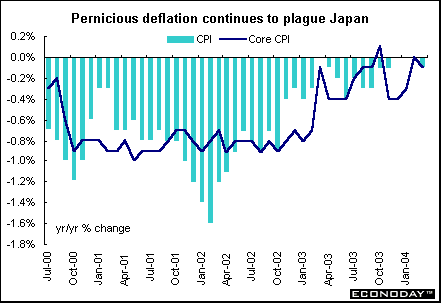
March unemployment dropped to 4.7 percent from 5 percent in the previous month. This is suggesting the labor market may be starting to reflect improvements in corporate sector activity and the recovery in other parts of the economy.
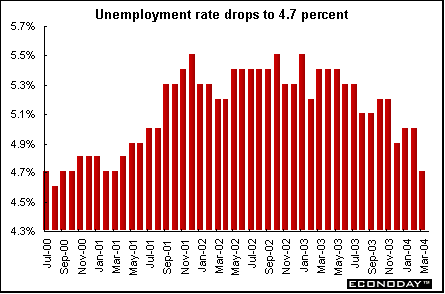
March real wage earner expenditures fell 0.5 percent from a year earlier. Wage earner spending is an important gauge of personal consumption, which accounts for roughly 55 percent of Japan's gross domestic product. Wage earner spending for the fiscal year ended in March was flat, after declining 0.5 percent the year before.
Americas
Canada - February retail sales soared 2.3 percent and were up 1.9 percent when compared with last year. Surging auto sales, combined with strong gains in the clothing, furniture, general merchandise and food sectors led total retail sales to new heights. February's gain was the strongest monthly increase since December 1997, when retail sales rose 3.6 percent. Excluding sales by motor and recreational vehicle dealers, retail sales advanced 0.5 percent after jumping 2.3 percent in January. Overall automotive sales jumped 5.2 percent after falling in each of the previous six month. Sales were up for all sectors with the exception of sales in other general merchandise sales.
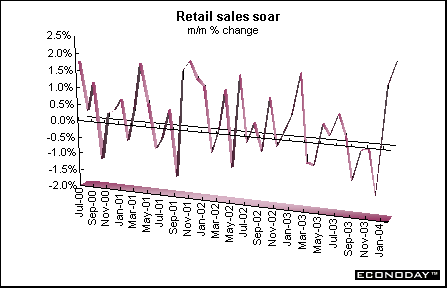
March industrial product price index was up 0.5 percent but dropped 1.4 percent when compared with last year. Prices on the month were higher for pulp and paper, petroleum and coal products, metal fabricated products, meat, fish and dairy products and fruit vegetable and feed products. Prices were lower on the year for motor vehicles and other transport equipment, electrical and communication products, chemical products, as well as pulp and paper products.
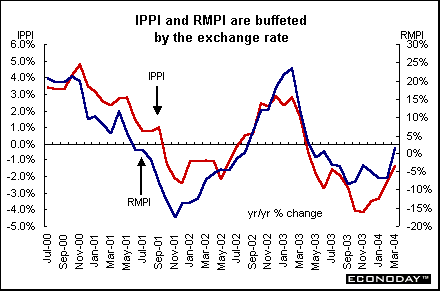
March raw materials price index jumped 4.5 percent and was up 1.4 percent when compared with last year. Mineral fuels were responsible for most of the monthly increase. Prices were higher for crude oil, animal and animal products, non-ferrous metals, vegetable products and ferrous materials on the month. On the year, prices for non-ferrous metals soared 31.7 percent mainly because of higher prices for copper, lead and zinc while ferrous materials prices were up 31.9 percent.
In March, the value of the U.S. dollar against the Canadian dollar remained almost unchanged. As a result, the total IPPI excluding the effect of the exchange rate would have remained at 0.5 percent. However, on a 12-month basis, the Canadian dollar is much stronger. Consequently, the IPPI excluding the effect of the exchange rate would have increased 1.6 percent on the year rather than declining 1.4 percent.
February monthly gross domestic product was unchanged but up 1.5 percent when compared with last year. Increased retail and real estate activity largely offset weaker utilities, wholesaling, and transportation services. Strong sales of cars and resurgence in the housing market boosted the output of the retail and real estate sectors. However, this growth was offset by the return to more seasonal weather and some strikes which pulled down utilities and the transportation activity. Canadian industrial production declined 0.3 percent as utility output returned to more normal levels. Manufacturing output grew marginally while mining gained ground.
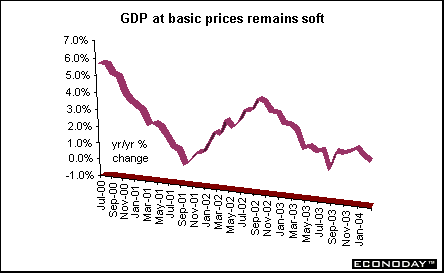
Bottom line
The nerves of central bank watchers will be stretched to the limit this week as the Federal Reserve, Reserve Bank of Australia, Bank of England and the European Central Bank all hold policy making meetings. Despite market jitters, the Fed is not expected to change its key interest rate from its current record low level of 1 percent at this meeting. But Fed watchers will be looking to the post-meeting statement for clues on when an increase might occur.
Most analysts do not expect the RBA to raise rates from their 5.25 percent level. To back up their view, they point to both recent comments by RBA Governor Ian McFarland, suggesting cautious optimism about economic prospects, as well as the recent mixed economic data in recent weeks.
Given the pronouncements by ECB President Jean Claude Trichet and others, the ECB is expected to leave its key interest rate at 2 percent despite continuing political pressures to do otherwise. However, the Bank of England is expected to increase its policy interest rate by 25 basis points to 4.25 percent in an attempt to curb surging housing prices and consumer debt.
Europe buried the legacy of centuries of war and division on May 1st when the European Union grew to 25 nations and 450 million people, stretched from the Atlantic to the Russian border. Fifteen years after the collapse of the Berlin Wall, the EU is set to welcome Poland, the Czech Republic, Hungary, Slovakia, the former Soviet republics of Lithuania, Latvia and Estonia, the ex-Yugoslav republic of Slovenia, the Mediterranean island of Malta and the Greek half of Cyprus.
Japan will be on vacation for most of the week as they celebrate the Golden Week holidays which began on April 29th and end on May 5th.
Looking Ahead: May 3 through May 7, 2004
